
BLOG
No, beloved, I cannot help you write and edit your next blog post UNTIL…
Sovereign Standard, Issue 30 You’ve got an idea for a really important blog post for your business’s website - brilliant!
You’ve got an idea for a really important blog post for your business’s website - brilliant!
Tell me about it. Tell me why you need to write it. Tell me the story that will glimmer with insight. Tell me what you’re asking your reader to do when she reaches the end.
What I want the writer to do? you ask.
Yes. You know, the call to action. It’s the logical, necessary conclusion to every business blog post. It’s anything from join my email list, to get my free report, to book a session.
Oh, you say, I’m not sure…
Well, how about you send them to your services page? In a pinch you can always say “learn more about what I do” and invite readers to delve more deeply into your website that way.
Um… I’d rather not. My services page is kind of outdated. I keep meaning to get back to it.
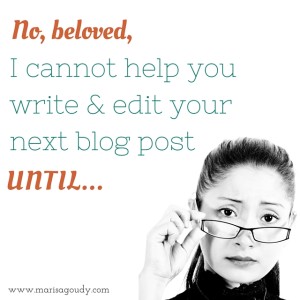 You’re starting to shut down. You’re kind of wishing you’d never asked me - your friend the writing coach - to look at something you wrote.
You’re starting to shut down. You’re kind of wishing you’d never asked me - your friend the writing coach - to look at something you wrote.
This is when I get a certain look in my eye. I really, really want to give you a hug, but I see you're pulling back. I know that feeling. The last thing I want to do is discourage your writing, but I have to be honest.
I am about to deliver some news you probably don’t really want to hear, but that you and I both know you need to hear.
This blog post isn’t where you need to put your energy, friend.
We’re wasting our efforts on this one precious article if you’re still struggling with pangs of website shame.
Tough love: 5 things your online presence needs BEFORE you invest time, energy, and writing coaching dollars in your blog
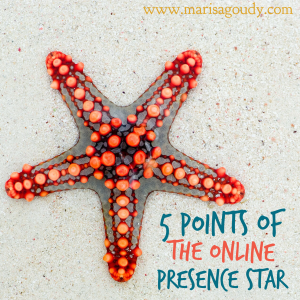 Whether or not you want to be a blogging superstar, regardless of whether you buy into the quest for any kind of superstardom at all, you need to be the star of your own online show if you're going to make your business work.
Whether or not you want to be a blogging superstar, regardless of whether you buy into the quest for any kind of superstardom at all, you need to be the star of your own online show if you're going to make your business work.
And so, before I start helping you promote yourself through blogging and content marketing, I want to be sure that you've shined up all the points on your online presence star.
[tweetthis]5 things I tell my friends to do before they write a #blog post[/tweetthis]
- You've got overall clarity on what your website is meant to do for your business. Your website is a key member of your sales force. Yes, even if you run a itty bitty business or a private practice you actually do have a sales force.It might just a force of two: you at networking events introducing your work and passing out cards and your website with the "book now" button. Make sure it's clear that your site has a job and be the boss who makes it do the work! (Note: your site does need to be more than an online booking platform - it welcomes prospects with a clear, comprehensive overview of who you are, what you offer, and what problems you solve, too!)
- Your About page shines with your Sovereign Story. Beyond sharing some key elements of your biography, the About page expresses your passion and your mission. It inspires people say “I want to have coffee with this person and find out how she can help me. Heck, I want to hire her!”
- Your Services page describes what you do and answers fundamental questions about your work. The Services page on your site is a resource for you too. When you’re new to business or you’re making changes in your practice, you can refer to your website as your organization's “manual.” You already figured out the length and cost of a session and you posted it for the world to see - no need to second guess yourself when someone asks your what you do and what you charge!
- You’re continuing your relationship with your reader by building a list. You get an extra gold star when you tell me you have an email opt in offer (like a video series or a report) that incentivizes sign ups, but simply asking people to join your community and entrust you with their email address is a great start.
- You’re consistently strengthening your relationship with your online community. Communicating with your list. Posting useful content on social media from a variety of sources. Starting conversations with colleagues, potential clients, and the people who inspire you… All of this helps you develop an online platform and build and audience so there’s someone there to read this awesome blog post that is blossoming within you.
Yes, but there are stories that must be told
What, what’s that you say? The blog post you need to write is burning you up inside?
It’s about your clients, your business, your relationship with how you serve the world and nothing makes sense until you get it out there. It’s one of those immediate stories that has to be birthed now, huh?
And you say that putting your concerns about list building over this really big idea just crushes your soul.
I get that.
Your friend the writing coach takes a deep breath... (that's me, remember).
I can’t help myself - I too am driven by story, art, connection, and the need to express that idea that will not be denied. I understand how you are dedicated to so much more than "doing the internet right.”
Alright. Just this once. Just ONE post. Show it to me. I'll make suggestions and edits and ask you to clarify a few things, ok? Expect to get it back by Tuesday. If it's that important we'll be the this one post will inform all those other web presence building activities I talk about above.
But, once this is published, do you promise that our next project involves a comprehensive review of your site so you can put website shame to bed forever? Or, if you're just not sure where to begin, we'll have a Message Development Session. Promise?
How shiny is your online presence star?
Help me understand where you are right now... Do you feel like you have all five points covered and you're ready for the blogging adventure?
If you're still polishing up your online star, which points feel bright and shiny and which could use some help?
Please let me know in the comments so I can craft some content that will help you set all five points aglow!
Blogging beyond tricks: how to work the magic of intention and attention
Sovereign Standard, Issue 29  There are so many blogging gurus and “easy peasy” blogging plans out there. I’ve never claimed to be a blog expert and I will never tell you that writing is an easy process that you can hack through.
There are so many blogging gurus and “easy peasy” blogging plans out there. I’ve never claimed to be a blog expert and I will never tell you that writing is an easy process that you can hack through.
Instead, I call myself a writing coach and I promise to guide you and walk beside you through what can only be called a dedicated practice of writing for business.
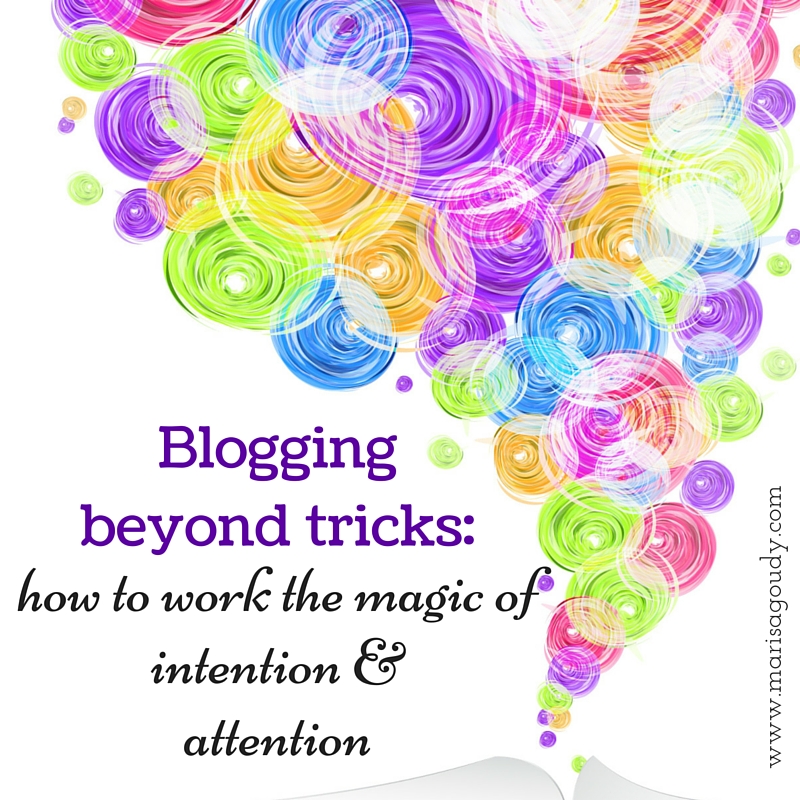 Yes, there are specific strategies that will make your blogging more effective - and will shorten the writing time. You can even shorten the editing process when you bring it to someone like me!
Yes, there are specific strategies that will make your blogging more effective - and will shorten the writing time. You can even shorten the editing process when you bring it to someone like me!
And yes, you might say there are blogging “tricks” that help you create posts that are really special - not because you’re pulling a fast one but because you’re working your own kind of magic.
You don’t need blogging tricks, but a little magic is always helpful
Something you should know about me: I believe in magic.
 Mostly, I believe in magic because I have no interest in living in a "what you see is what you get" world. I believe in the magic of stories, symbols from nature, and the depths of dream.
Mostly, I believe in magic because I have no interest in living in a "what you see is what you get" world. I believe in the magic of stories, symbols from nature, and the depths of dream.
I also believe that magic flows when you focus your intention and attention. That’s exactly how words and sentences flow too.
You don’t need tricks to make your writing practice work for you and your business. You need a strong intention and you need to give your writing the attention it deserves.
[tweetthis]Magic flows when you focus your intention and attention. Same is true for your #writing.[/tweetthis]
Before you write a word: begin with intention
When you sit down to create content for your blog, what motivates you?
- You’re trying to keep up with those “epic content dudes” who tell you that modern business is about publish or perish.
- You’re fulfilling a promise to your coach or some sort of accountability group.
- A general case of the “shoulds.” You’re not even sure why you’re blogging, but you figure you better get started because you’re already so far behind.
- You wish to explore a long percolating idea or a sudden flash of insight. Taking these ideas beyond scribbled notes and Word docs and into the public arena deepens the process and opens new perspectives.
- You’re writing out of love and service, trusting that the people who need to hear your message will offer your words the attention they deserve.
Because this is a post about a writing practice guided by personal intention and attention, there’s no single right answer.
There are, however, a few very wrong answers – if your motivation to write is based purely on obligation or fear.
Your “why” is the source of your writing magic
When you don’t know why you’re writing something - when you’re unclear of your intention - it’s nearly impossible to connect with the reader.
When you don’t connect to your reader, you’ll never achieve the goal of the post or article.
Your goal may be simple: “get more business.” But no one will get past the first few lines of a blog post if it’s clear the writer is only in it for the sale. The reader also won’t get very far if it seems the writer is just publishing because someone told her she “should.”
So why are you really writing?
Call me a romantic. Call me an idealist. Heck, call me a writer! I believe the only writing that ultimately succeeds is composed in a spirit of love and service.
Consider the success of direct mail copywriters and lousy popular novelists. Clearly you can write successfully when inspired by the love of money and in service to the beast of fame. I’m not here to judge those folks. They prove that passion and dedication will get you what you want.
But I think you’re a little bit more like me than you are like the guy with the perfect marketing formula.
You care deeply about your business and what you offer your clients. You love the people who buy from you – and not just because you adore the ka-ching of your PayPal notification tone.
Thing is, you don’t necessarily love writing for your business. Put it another way - you haven’t fallen in love with the writing process yet because you don’t understand the why of your attraction.
[tweetthis]The only #writing that truly connects is composed in a spirit of love and service.[/tweetthis]
Your writing “why” has a name and a face
A lot of brilliant people say you must write for yourself first.
“Close the door. Write with no one looking over your shoulder. Don’t try to figure out what other people want to hear from you; figure out what you have to say. It’s the one and only thing you have to offer.”
Barbara Kingsolver is exactly right.
Hear a “but…” statement coming?
Presumably this great novelist is talking about fiction, not writing a blog post that helps bring in business.
Kingsolver would be spot on if we were still in the heady days of personal blogs when finding your voice was so central and “if you write it, they will come” was still semi-true.
Now, many take selfies to tell personal stories. Creative entrepreneurs and therapists use blogs to further their business, art, and practice in a more systematic, strategic way.
You can tell your personal stories just about anywhere. Your business blog exists to serve the reader. (Your stories are important, but they're the vehicles that carry your message, not your writing's fundamental raison d'etre.)
Your reader is your “why.” To satisfy her needs and curiosity… that must be your intention every time you publish a post.
The blog is the place to engage the reader with stories that illuminate her story. The blog sustains the reader with solutions to problems that keep her up at night.
Ok, your blog is still about you - in a way
There’s one part of blogging that’s about you: determining what sort of content you can comfortably, sustainably create. After all, creating content is a marathon, not a sprint.
This goes back to intention… You’re intentionally building a business around your gifts, your passions, your desire to solve the problems of a community of people you love.
Logically, any writing you do to support this work will feel doable - even if the writing itself still takes a lot of effort.
 But, if every writing session is torture and you feel like a house fell on your sister rather than you're flying in an orb of fairy dust, there is something wrong.
But, if every writing session is torture and you feel like a house fell on your sister rather than you're flying in an orb of fairy dust, there is something wrong.
You need to figure yourself into the writing process too and make adjustments to your writing routine, topic choice, and delivery style. If you don’t feel like a good witch when you’re writing, change your approach.
When your writing process feels more like a Dark Art rather than a lovely session with Glinda and Dorothy, let’s set up a complimentary 15 minute chat and share a long distance cup of tea so I can help you identify at least one adjustment you can make right away.
Once your intention is clear, you know where to direct your attention
Writing can be an emotional entanglement of sorts. Everyone has a different relationship with their words, but there’s one common factor in every writer-writing relationship -- attention.
An attention-starved writing practice is absolutely nothing but a dusty notebook inscribed with regret.
You love your business, you love the people you have been called to serve.
And so we return to:
You write online content out of a spirit of love and service, trusting that the people who need to hear your message will offer your words the attention they deserve.
When you show your love to your business and your reader-clients, they repay your intentional attention with their own (incredibly valuable) attention.
Blogging = Love. So how do you fall in love with the writing process so you can share the greater love?
Because I want to wave my magic wand and take the pain out of blogging for you, I am tempted to tell you that you can click your heels together with intention and pay simply attention to what the Wizard says.
There’s a great chance that getting clear on your "why" and sitting down to DO the writing is all you need. But that does you a great disservice if you’re someone who feels like she can’t cast a writing spell without some help.
You have other options. You can create video. You can start a podcast. You can create visual experiences for your beloved community.
You can explore the different kinds of writing support that are out there and make a decision based on your skills and resources.
And you and I can talk about your writing-for-business intentions and how they mix - or don’t! - with your reality as an entrepreneur or clinician whose attention is already pulled in so many directions.
Send me a note and we’ll schedule 15 minutes to sip tea and talk about how you can find the magic in your own message.
A Writing-for-Business Practice is a Writer’s Practice
Sovereign Standard, Issue 28 An editorial calendar is nothing; a writer’s practice is everything.
An editorial calendar is nothing; a writer’s practice is everything.
I kind of stole that from Ike.
 “Plans are nothing; planning is everything.”
“Plans are nothing; planning is everything.”
President Eisenhower was likely talking about the planning process required for taking a beachhead or running a country, but his statement encouraged me to think about blogging and writing for your business in a new way.
[tweetthis]Making a plan for your #blog is nothing. The #writing process is everything.[/tweetthis]
Making a plan for your blog is useless. The writing process is everything... When the coaching industry exists to sell you strategies and organization tips, this sounds like heresy, but editorial calendars are meaningless to me - and I bet they’re pretty useless to you too.
Forget editorial calendars. Writing is sustained by practice (and, well, writing).
I write and support writers for a living, but I have never had an editorial calendar.
[tweetthis]An editorial calendar is nothing; a writer’s practice is everything.[/tweetthis]
I’ve started plenty of spreadsheets called “editorial calendar.” I’ve listed publication target dates on the left side and created columns with important headers like “title,” “category,” and “call to action.”
And then… I’ve never gotten past the first entry. Six months later, inspired by advice I’ve given to my own clients, I try all over again (sometimes I even remember to just copy and past the old, useless calendar).
Invariably, however, I fall back into my old “no-plan plan.” And the writing still gets done.
Why do I do it this way? Because it works.
Does it work because I’m a born writer who thrives on chaos rather than organization?
Nope.
It works because I’m dedicated to my writing-for-business practice. And it’s not the sort of practice that you can outline in marathon sessions every few months.
The writing-for-business process is the very process of being a business owner, a thinker, and a writer. And it happens in its own time, according to what you’re learning and how you’re growing in real time.
What is a Writing-for-Business Practice?
To be a professional who writes to support your business, you have to sit down and put words on a page - but it’s about so much more than that.
To have a real writing practice that works, that actually supports and furthers your professional goals, you need to invest yourself in the entire process from generating and channeling ideas to publishing and sharing your content.
You don’t need to follow anyone’s specific framework or keep track of your progress according to any set form, but you do need to understand your own process well enough to replicate what works so you can publish according to your own schedule, week in and week out.
5 Key Elements of a Business Visionary's Writing Practice
This list isn’t exhaustive. The writing practice - even when it’s for business rather than pure creative expression - it’s a fiercely personal endeavor. You can make it as simple or as complex as as you are.
After five years of writing my own professional posts and helping many clients develop theirs, here’s a bit of what I know must be part of your practice:
- Curiosity - You look for the layers of the meaning in the every day.
- Storytelling - You see the potential plot lines, themes, and characters in your seemingly mundane experiences.
- Dedication - You show up to write regularly, even when life and “real” work want to get in the way.
- Tenacity - You keep writing and publishing even when no one seems to be listening (keep at it, produce well-made, fascinating content and, eventually, people will read, share, and take action).
- A recognition that writing is its own reward (at least at first) - The process sustains you and you’re able to see the benefit in organizing your thoughts and becoming a stronger writer - even before the loyal following shows up.
The Writing-for-Business Routine
Above, I say that the writing-for-business practice happens in its own time. That’s true, but in order for it to be a practice, it has to have a reliable enough rhythm.
Here’s the flow of my writing routine when it comes to producing weekly blogs:
- take notes consistently (the notebook goes everywhere and scraps of ideas get written down because there’s no telling what will grow into something big and important)
- draft the post on Tuesday and Wednesday
- edit on Thursday
- format and schedule it in WordPress before bed on Thursday night
- read it all over just once more just before it goes live on Friday morning
One writer’s process is just that - one writer’s process. I wouldn’t assume to tell you this is the best schedule to follow.
My weekly process shows you that even though I am free of the editorial calendar, I am not without discipline and commitment. You may not be planning your writing weeks and months in advance, but you are planning to write every week.
Another important thing to note as you settle into a writing routine: give yourself time between “that would make a great blog post” and clicking publish.
Time heals wounds and it also exposes faults in logic, boring storylines, and egregious typos. You need some distance from your writing to see your blind spots, so don’t try to go from start to finish in one session.
A writing-for-business practice is a writer’s practice
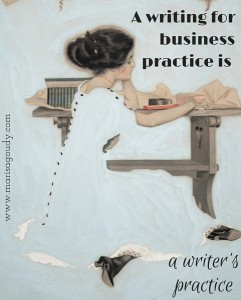 Gone are the days of the elitist “real writer.” There's no need to play the artist or the intellectual who separates herself from the hack and the profiteer.
Gone are the days of the elitist “real writer.” There's no need to play the artist or the intellectual who separates herself from the hack and the profiteer.
When you go to practice, you expect to see a coach there
I don't generally do sports metaphors when I talk about my writing coaching. (If you're the kid whose single basket during middle school YMCA basketball is still a point of pride for your poor dad, the coach, you'd avoid talking about sports too.)
And yet, as I talk about the importance of practice and the longterm commitments and implications of such a practice, it does feel like I'm asking you to get better at playing a game. And in order to really hone your skills, you want a guide and an ally to teach you new skills and refine your own natural abilities. You want a coach.
I would love to support you and help you discover a writing-for-business practice that you can sustain and that can sustain your business.
And if you’re someone who thrives on spreadsheets and long term visioning, I can even help you create and maintain an editorial calendar (just don’t ever ask to look at mine!).
Consider what the Sovereign Standard Writing Coaching Program can do for you.
Why You - and Your Business - Need the Creative Constraints of Blogging
Sovereign Standard, Issue 27  Big-eared and sweet-eyed, the doe is where nature's sense of peace and trust collide with the potential for flight and terror.
Big-eared and sweet-eyed, the doe is where nature's sense of peace and trust collide with the potential for flight and terror.
Earlier this week, my 19-month-old and I shared a sacred, homey moment with the local deer herd. It was a well-earned pause after over two weeks and over 2000 miles of travel.
As I watch, I’m rooted in the moment, but I’m filtering it all through my writer’s lens. Am I distracting myself from being in the moment by taking mental notes and adapting family stories to prove a professional point?
It’s my way of being in the world and I don’t think I could ever stop. In fact, I think this kind of dual awareness is essential to leading a writer’s life.
A blogger's confession: sometimes, I don’t want to write a story you’ll care about
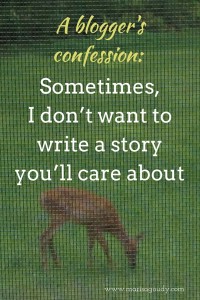 Thoughts of “this would be great in a post” aren't distracting me. It’s the stupid the window screen and the way I have to keep shifting my gaze so I see the deer rather than the crisscross patterns.
Thoughts of “this would be great in a post” aren't distracting me. It’s the stupid the window screen and the way I have to keep shifting my gaze so I see the deer rather than the crisscross patterns.
To deal with my annoyance, I play with the metaphor. As I muse about what divides us from nature and the sheer pleasure of the present moment, I consider the scene from a dozen different angles.
But really, I just want to describe this moment. I want to dwell on how it’s my grandmother’s birthday, and though she’s been gone for over a decade, this feels like her blessing. I want to revel in the way my daughter’s hair looks like rose gold in the dawn light.
Truthfully, I want to forget about you, dear reader. I want to pretend I can't hear your ever-present question: “What’s in this story for me?”
I want to transmit the magic of this moment without concerning myself with how it’ll further your writing practice. I want to present the trust of that wild animal’s eyes and leave it you to run with the story on your own fleet hooves.
Thing is, I would never get around to writing such a sweet little vignette.
The Power - and Necessity - of Creative Constraint
Constraints give us a starting point and some building blocks to work with—a problem to solve, an innovative twist to be revealed, or a person to please. - David Sturt
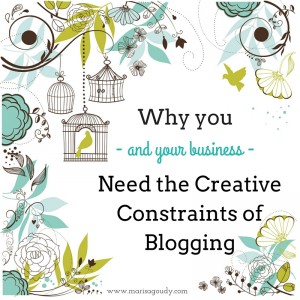 Without constraints, you struggle to find a container or a framework that grounds your creative work. You need a venue, a deadline, and an audience with a set of expectations to get your ideas out into the world on a regular basis.
Without constraints, you struggle to find a container or a framework that grounds your creative work. You need a venue, a deadline, and an audience with a set of expectations to get your ideas out into the world on a regular basis.
My weekly Sovereign Standard posts demand that I focus my “I could write about anything!” energy and actually publish something worthwhile each week.
I think if you’re given a clean, fresh palette, and you do whatever you want, it’s almost too much freedom, at least for me. - Damien Correll in Belle Beth Cooper’s article about how artists and entrepreneurs use limitation and restriction to create great things.
The business blog is an inherently restrictive platform. It has limits - thank goodness!
The delectable, reliable constraints of your biz blog
A business blog post needs certain elements to be successful. These characteristics are what differentiates it from a personal or “hobby” blog where you can write whatever you want. (Within reason… you still have to produce interesting, well-written content on a non-commercial blog.)
Each professional post must:
- Have a goal. You want your reader to do something at the end of each post based on your Call to Action (CTA). The whole post is leading your ideal client to take the next step and engage more deeply with your brand. Ask them to sign up for your newsletter, listen to the podcast you just appeared on, or call to set up a free introductory consult.
- Make the reader the hero. Even as you tell captivating, elevating stories - many of which may be inspired by your own experience - you need to consider how the reader is experiencing the narrative. Can she relate to what you’re talking about and understand how the story is a guide of what to do or what not to do?
- Know the value of attention. The job of each sentence is to get the reader to reach the next sentence. Don’t squander your reader’s precious time on extraneous details that don’t either draw her into your world or give her something useful to do or consider.
- Appeal to the skimming reader. Your blog is not a book, a term paper or your thesis, or a professional document. Don’t sacrifice your voice to imitate the style of UpWorthy or even Copyblogger, but remember that people are reading your work on an iPhone, not from a leather bound volume. Honor your reader’s splintered modern attention spans or prepare to lose her to the next shiny digital object.
What NOT to write about on your biz blog
You can’t abandon a regularly scheduled post that’s full of practical information about maintaining a strong marriage in order to simply rave about your romantic getaway.
You can’t skip the tips about managing your children’s difficult behavior just to describe how smoothly the first day of school went at your house.
You can’t rave about how delicious the gluten free blueberry cream cheese coffee cake you just made without including the recipe.
You wouldn’t post content like this on your business blog because it sounds like self-centered bragging, of course. Without the “news they can use” or the moral to the story, you’re likely wasting your reader's time.
Think about “what not to write” from the positive side: you wouldn’t want to miss the opportunity to offer the helpful content your readers love just because your muse wants to linger in the afterglow of a life well lived.
Get a room. Better yet, get a guest post spot.
Personal experiences provide excellent material for your professional blog. Just be sure you do it with respect and set your TMI filters to “very, very picky.”
But, when you find your story cup overfloweth and you want to explore ideas that don’t connect directly with your business, remember that there’s a whole other world of blogs out there that don’t demand that your writing leads to an obvious, income-boosting call to action.
People with passions for stories, readers who seek out beauty and inspiration… They’re out there, and they’d love to have you write for them.
If and when you do land a guest spot on a blog that focuses on travel, parenting, or cute fuzzy puppies, do remember to maintain your own Sovereign Standard and honor the advice you’ve picked up here!
Other lessons from the deer and the little girl who scared her away
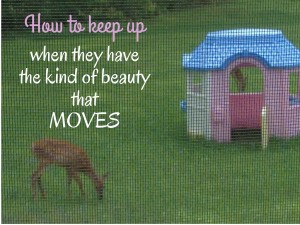 I’m honored that my friend Vanessa of Nessa Knows Best has offered me a guest blogging position on her site for savvy moms.
I’m honored that my friend Vanessa of Nessa Knows Best has offered me a guest blogging position on her site for savvy moms.
There were countless ways I could have explored the metaphor of the window screen, the doe, and the toddler… which did I choose? Come read How to keep up when they’ve got the kind of beauty that moves.
The Agony and the Ecstasy of Following Your Own Advice
 This post is being written from an undisclosed location. There’s no cell service, but there is WiFi, and while I have not completely honored the “no work during this vacation” rule, I have only popped on to social media to do professional stuff, not to post pictures of my girls in paradise.
I’m in my sacred place. When I tuck my girls into bed, in addition to calling in the sweet family ghosts, I bid my own child-self to watch over them.
This post is being written from an undisclosed location. There’s no cell service, but there is WiFi, and while I have not completely honored the “no work during this vacation” rule, I have only popped on to social media to do professional stuff, not to post pictures of my girls in paradise.
I’m in my sacred place. When I tuck my girls into bed, in addition to calling in the sweet family ghosts, I bid my own child-self to watch over them.
Here, my daughters count the same faded roses on the wallpaper of the “middle bedroom.” They creak back and forth in the same backyard swing. They’re told not to pull the bark from the same birches that line the grove beside the house like rows of endless summer sentinels.
My decision to keep the photos in the sanctity of my own smartphone’s memory wasn’t a conscious one.
I may start Instragramming at any moment. But each time I consider it, I think of the two days we spent in the car to get here. Maybe you need to put yourself through that to take part in this sort of beauty.
Or maybe I’ll feel like this kind of perfection shouldn’t be hoarded and I will start to share.
And so, it seems that I am taking my own advice. A couple weeks ago, I asked is that adventure really worth blogging about?
This adventure is worth so much more. The blog can wait. The heron in the marsh, the tea in the pot, the children rooting into the same red earth that’s so much a part of their mama… that needs my attention right now.
A couple of sweet reads on the topic of pausing for what’s most important:
Brenna Layne talks about Recalibrating. Full of perfect lines, this piece is about getting back to the routine, making peace with being away, and wrestling a neglected story back into relationship with a big bear hug.
Stories, like people, get crotchety if they’re ignored.
Autumn is a truthful season, revealing the world in all its messy glory.
And then there’s Suzi Banks Baum on her Laundry Line Divine. In Monday Morning at the Lake she writes of how she took the advice about whether each summer holiday adventure needed to be blogged about. I love the way she danced with the idea, typing lightly in the midst of family in her most beloved place.
Creative practice happens no matter what the sky looks like.
So true, Suzi, but creative practice may need to take on a totally new form that has nothing to do with blogging and entrepreneurial vision when the sky looks like this...

